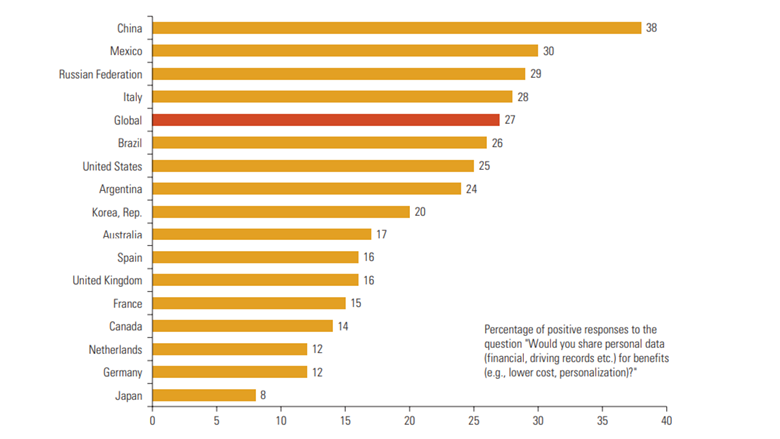Report by the World Bank: “…Decisions based on data can greatly improve people’s lives. Data can uncover patterns, unexpected relationships
Data is clearly a precious commodity, and the report points out that people should have greater control over the use of their personal data. Broadly speaking, there are three possible answers to the question “Who controls our data?”: firms, governments, or users. No global consensus yet exists on the extent to which private firms that mine data about individuals should be free to use the data for profit and to improve services.
User’s willingness to share data in return for benefits and free services – such as virtually unrestricted use of social media platforms – varies widely by country. In addition to that, early internet adopters, who grew up with the internet and are now age 30–40, are the most willing to share (GfK 2017).
Are you willing to share your data? (source: GfK 2017)

On the other hand, data can worsen the digital divide – the data poor, who leave no digital trail because they have limited access, are most at risk from exclusion from services, opportunities and rights, as are those who lack a digital ID, for instance.
Firms and Data
For private sector firms, particularly those in developing countries, the report suggests how they might expand their markets and improve their competitive edge. Companies are already developing new markets and making profits by analyzing data to better understand their customers. This is transforming conventional business models. For years, telecommunications has been funded by users paying for phone calls. Today, advertisers pay for users’ data and attention are funding the internet, social media, and other platforms, such as apps, reversing the value flow.
Governments and Data
For governments and development professionals, the report provides guidance on how they might use data more creatively to help tackle key global challenges, such as eliminating extreme poverty, promoting shared prosperity, or mitigating the effects of climate change. The first step is developing appropriate guidelines for data sharing and use, and for anonymizing personal data. Governments are already beginning to use the huge quantities of data they hold to enhance service delivery, though they still have far to go to catch up with the commercial giants, the report finds.
Data for Development
The Information and Communications for Development report analyses how the data revolution is changing the behavior of governments, individuals, and firms and how these changes affect economic, social, and cultural development. This is a topic of growing importance that cannot be ignored, and the report aims to stimulate